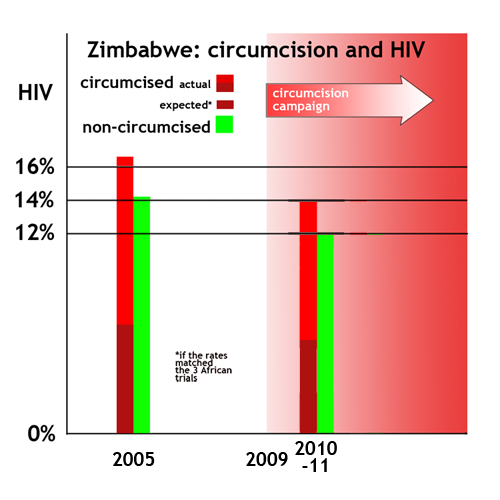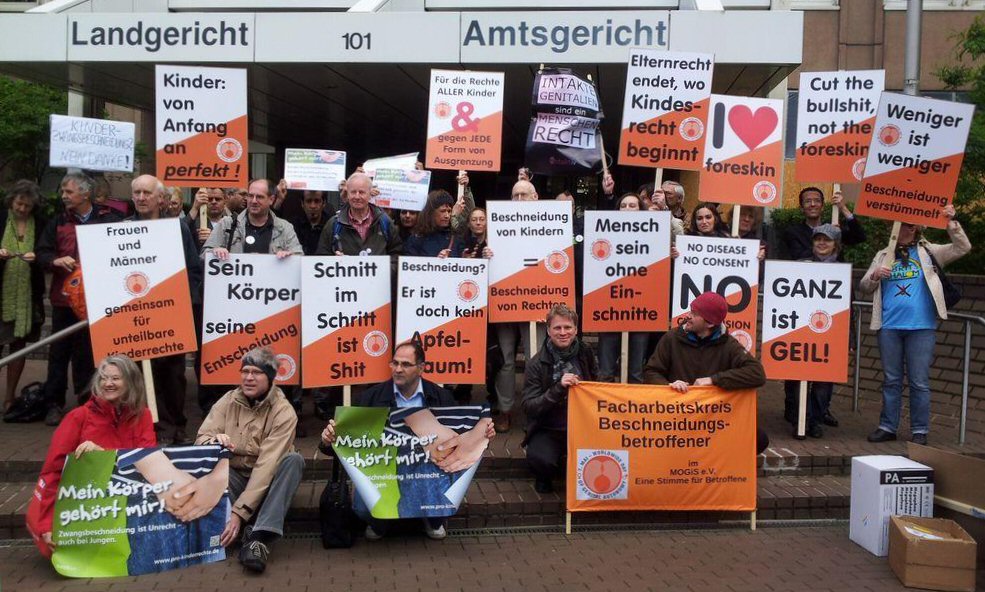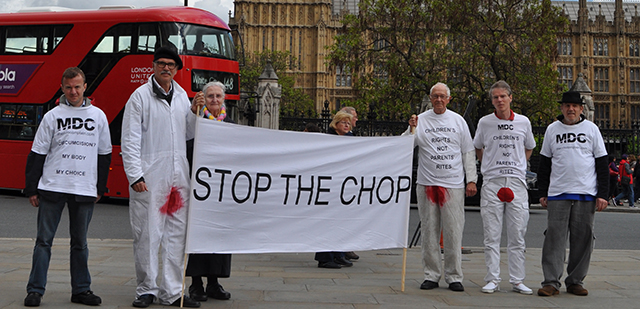|
Bulawayo24 (Zimbabwe) Child circumcision ignites debateZimbabweans have expressed mixed feelings over an on-going male circumcision campaign, especially that which targets children. Zimbabwe introduced ["voluntary"] medical male circumcision in 2009 following studies indicating that the procedure reduces chances of contracting HIV by 60 percent. More than 40 local members of parliament volunteered to be circumcised in a campaign targeting 1,2 million males by 2015. Population Services International, a US-based global health agency, is offering the testing and circumcision procedures. There are others who believe the 2009 medical male circumcision campaigns being churned out through the media were misleading as they try to portray circumcised men as "confident, outgoing, sexually appealing, and set to succeed in life." Raymond Majongwe, a National Aids Council, Nac board member said the media campaigns on male circumcision were mischievous in that they give a false sense of security to those who would have gone under the knife. "They then think they are macho and can go on bedding girls. It is like a licence to be promiscuous. "I also do not believe in those said ‘celebrities' that are being used to promote the idea. Stunner for example, is another male circumcision ambassador who after being circumcised went on to shoot a sex video that went viral, exposing his circumcised manhood," hit Majongwe at a recent gathering in Chinhoyi. Stunner underwent circumcision in 2011 before he and Pokello recorded themselves having sex and the images later found their way on Internet and multimedia, first via Facebook and later circulated via WhatsApp. Majongwe said it was puzzling that while God created man with the fore skin, there are others who now believe it has to be removed. "God created us that way," said Majongwe adding that he has always been skeptical of the on-going male circumcision campaigns. Dr. Karin Hatzold, deputy head of Population Services International (PSI) Zimbabwe, said her organisation is using entertainers to persuade young men to get circumcised. "We have campaigns that are specifically targeting adolescents, people in schools — so during school holidays we are doing massive mobilisations on mass media... "So get smart, get circumcised. Male circumcision is not only HIV prevention intervention, but it is improving hygiene, you are cleaner, you are smarter.'" Matobo senator Sithembile Mlotshwa once touched off a storm when she called on the ministry of Health and Child Care to stop circumcising children under the 2009 medical male circumcision programme. In media reports, Mlotshwa was quoted as saying: "In our constitution, everyone is born with a right to life and I think it is wrong for a father and mother to sit down and decide to circumcise this young child who is a month old whereas the father was circumcised at the age of 40. "This circumcised man's parents gave him all these years to mature and know the uses of all the organs of his body so as to decide how best to remake what is God-given. "So then why does this person want to agree with his wife to circumcise an infant who is a third person who has a right to be fully developed as he is so that he makes his own decisions about his body organs?" Mlotshwa believes children should be allowed to make their own choices when they grow up instead of being circumcised under this programme funded by international donors. "I want to take our minister of Health to task because I believe that you don't have to circumcise infants." Celebrated writer Virginia Phiri said the fact is that circumcision of males has always been there. "That is either for religious or traditional beliefs and at times for medical conditions." ... "As this procedure is not easily reversible or it can be expensive to do, so these sons will have to live with the situation that they will find themselves in," she said. ... Legislator Jessie Fungayi Majome said it is a sad or happy (depending on the circumstances) fact of life that children are bundled with the fate and decisions of their parents. "To cut or not to cut must be decided according to which of the two is in the best interests of the child as required in our new Constitution. "I think more research must be done to give objective knowledge of the pros and cons of male circumcision. "Any circumcision campaign must still and concurrently emphasise the necessity to either abstain, or be faithful or use a condom," said Majome. [Any of which makes circumcision irrelevant.] ... Social commentator Precious Shumba ... added that from experiences of some residents, a circumcised person cannot abstain from sex, meaning there is reported increase in the demand for sex, risking infection. Political activist Tabani Moyo said ... "... those agitating circumcision should engage in ethical advertising by outlining the dangers that come with the process so that when people decide to do it, they do so with all the critical information at hand. "At the moment, there is too much high voltage advertising which borders on deceit that might end up leading to unintended consequences as the adverts seem to give an impression that your chances of getting HIV/Aids for example are reduced, this is irresponsible advertising," said Moyo. ... Pan Africanist, Thomas Deve said what we know about circumcision makes us welcome it for health and religious purposes or as a rite of passage to manhood in some traditions. "I am sceptical of the Americans pouring in money via the PSI-led initiative when they are withdrawing state-funded programmes in their own country," said Deve. PSI's health director Louisa Norman has been quoted in the media as saying: "If we can circumcise 1,2 million men by 2015 we can prevent 750 000 new cases of HIV, which means we can really start to envision a country in which there are no new HIV infections." [These figures are based on "modelling", assuming the "60%" reduction claimed in the three trials translates exactly on to the real world - in other words, Just Made Up.] Zimbabwe has 1,1 million people living with HIV, including 150 000 children, according to Nac. [And more of the circumcised men have HIV than the non-circumcised:]  |

